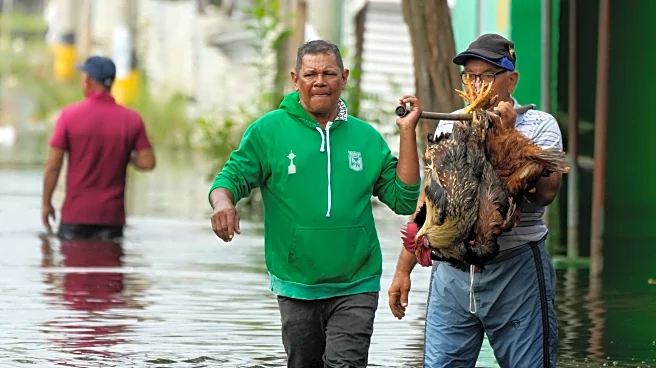Rapid Read • 8 min read
Hiroshima marked the 80th anniversary of the atomic bombing with ceremonies attended by survivors, officials, and representatives from 120 countries. The event highlighted concerns over the growing acceptance of nuclear weapons as a deterrent, particularly in light of global conflicts such as Russia's war in Ukraine. Survivors, whose average age now exceeds 86, expressed frustration over the lack of progress towards nuclear disarmament. Hiroshima Mayor Kazumi Matsui and other officials called for renewed efforts to eliminate nuclear weapons, warning against policies that could lead to future tragedies.
AD
The anniversary serves as a poignant reminder of the devastating impact of nuclear weapons and the ongoing threat they pose. With the number of survivors dwindling, there is an urgent need to preserve their testimonies and advocate for disarmament. The event underscores the tension between nuclear deterrence and disarmament efforts, as countries like Japan rely on nuclear protection while advocating for a nuclear-free world. The commemoration also highlights the ethical and humanitarian implications of nuclear weapons, urging global leaders to prioritize peace and security.
The push for nuclear disarmament is likely to continue, with survivors and advocacy groups calling for stronger international commitments. Japan's government faces pressure to sign the Treaty on the Prohibition of Nuclear Weapons, despite its reliance on U.S. nuclear deterrence. The international community may see increased dialogue and negotiations aimed at reducing nuclear arsenals and preventing proliferation. The anniversary could also inspire younger generations to engage in peacebuilding efforts and challenge policies that support nuclear armament.
The commemoration raises questions about the moral responsibility of nuclear-armed states and the role of historical memory in shaping future policies. It highlights the need for education and awareness to prevent the repetition of past mistakes. The event also reflects broader geopolitical dynamics, as countries navigate the complexities of security, deterrence, and disarmament in a rapidly changing world.
AD
More Stories You Might Enjoy












